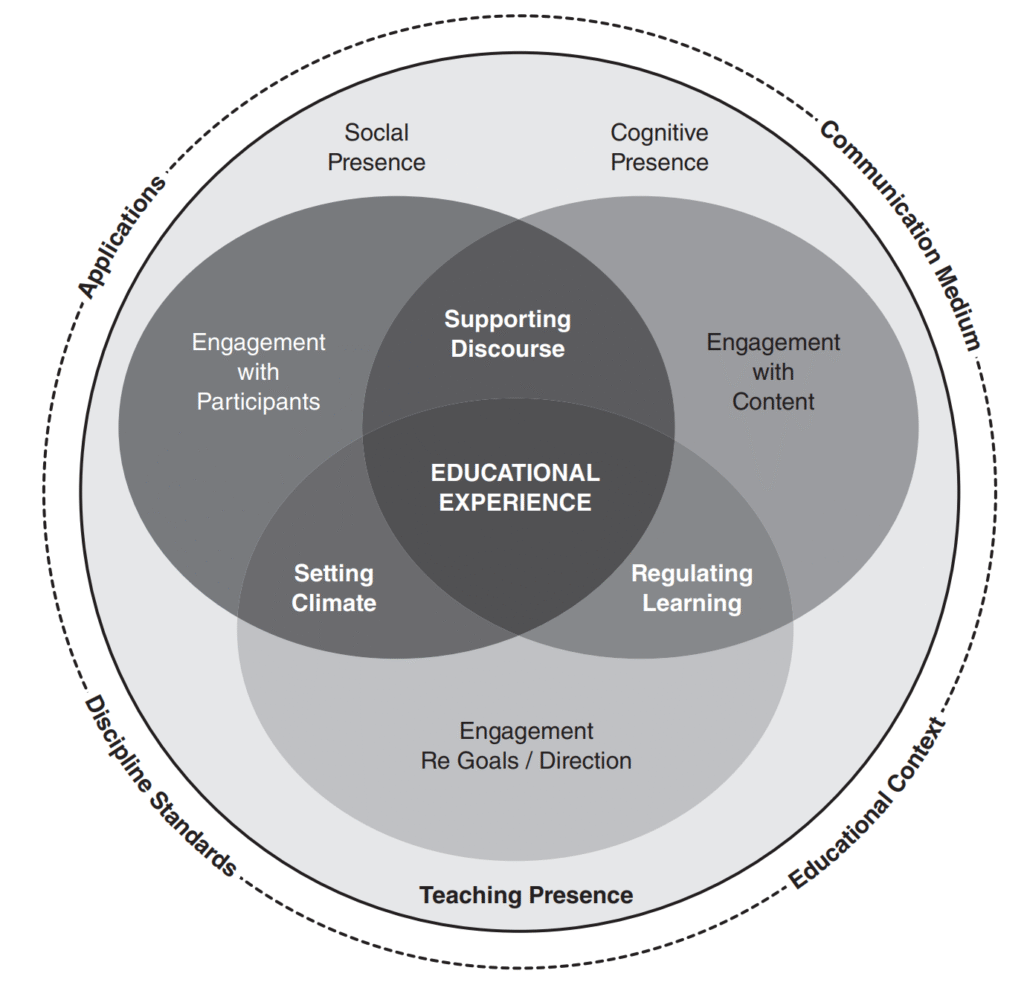As an emerging AI Learning Manager, I see the intersection of technology, pedagogy, and human experience as the future of online learning. My goal is to integrate proven learning frameworks—such as the Community of Inquiry (CoI), Moore’s Theory of Transactional Distance, Sorensen & Baylen’s Seven Principles of Good Online Learning, and the Practical Inquiry Model (PIM)—to design courses that are not only efficient but emotionally intelligent, adaptive, and deeply human-centered.
Building Human-Centered Connection: The Community of Inquiry (CoI)
At the heart of every successful online course is connection. The Community of Inquiry Framework emphasizes the importance of social, cognitive, and teaching presence—three pillars that guide how learners build meaning together. As an AI Learning Manager, I use these pillars to ensure that AI tools amplify rather than replace the human relationships that drive learning.
For example, within Brightspace, AI analytics can identify when discussions lag, and intelligent agents can prompt instructors to re-engage learners through personalized nudges or adaptive discussion prompts. This balance of automation and empathy strengthens both social and teaching presence, ensuring learners feel seen and supported throughout their journey.
Reducing Distance Through Dialogue: Moore’s Theory of Transactional Distance
Moore’s theory reminds us that distance in learning isn’t about geography—it’s about communication and connection. As an AI Learning Manager, I design systems that shorten this gap using real-time feedback loops and adaptive learning structures.
In practice, this means embedding AI chat assistants in Brightspace that respond instantly to learner questions, clarify expectations, and notify instructors when deeper intervention is needed. This hybrid model enhances immediacy while keeping the human-in-the-loop, ensuring that AI support complements—not replaces—authentic instructor presence.
Keeping Pedagogy First: Sorensen & Baylen’s Seven Principles
While AI enables speed and personalization, pedagogy remains the compass. The Seven Principles of Good Online Learning—including active learning, prompt feedback, cooperation among students, and respect for diverse learning styles—inform how I design each element of a course.
For example, Brightspace’s Intelligent Agents can automate personalized feedback and reminders, while Performance+ Analytics can identify engagement gaps, prompting targeted interventions. These tools support instructors in maintaining timely, meaningful interactions that honor diverse learner needs while reducing administrative load.
Guiding Reflection with the Practical Inquiry Model (PIM)
The Practical Inquiry Model (Fiock, 2020) is an ideal scaffold for transforming learner frustration into curiosity. I apply PIM’s four phases—Triggering Event, Exploration, Integration, and Resolution—to design adaptive learning experiences that promote self-efficacy.
For instance, in an orientation module, students might begin by identifying a frustration they’ve had with technology (triggering event). Next, guided by AI journaling tools, they explore potential strategies and reflect on what worked (exploration and integration). Finally, they apply these insights to navigate a real activity in the LMS (resolution). This approach builds confidence, turning technological friction into an opportunity for growth.
The Role of AI: Adaptive Autonomy and Continuous Support
AI is not a substitute for pedagogy—it’s a force multiplier. By integrating adaptive learning pathways, AI-assisted discussion prompts, and reflective journaling, I create an ecosystem that continuously responds to learner needs. Learners can move at their own pace while receiving personalized feedback, and instructors can focus on higher-order teaching tasks and emotional connection.
Through tools like Brightspace Performance+, FeedbackFruits, and Intelligent Agents, I’m building systems that adapt pacing, content, and support dynamically—allowing learners to progress with autonomy while maintaining structure and accountability.
A Vision for the Future of AI-Enhanced Learning
The next generation of online education will depend on how effectively we integrate AI into sound pedagogical frameworks. As an AI Learning Manager, I’m dedicated to designing learning experiences that blend human warmth and technological intelligence—where data supports empathy, automation enables reflection, and every learner feels capable, connected, and inspired.
This approach is not just about efficiency—it’s about elevating the human experience of learning in an increasingly digital world.


Leave a Reply
You must be logged in to post a comment.